Â
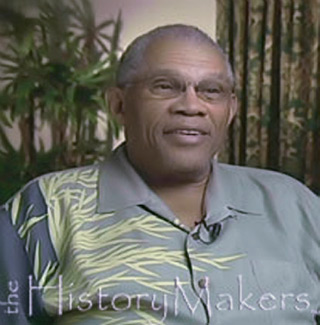
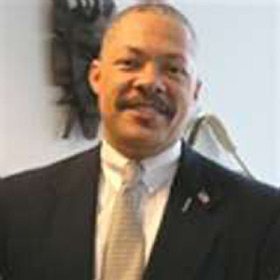
Judge David S. Cunningham III
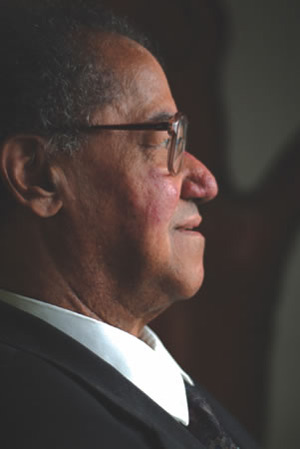
Maxcy Filer
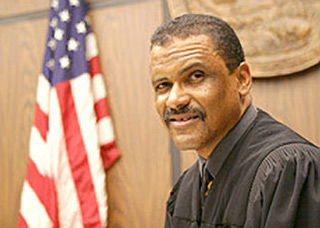
Judge Kelvin D. Filer
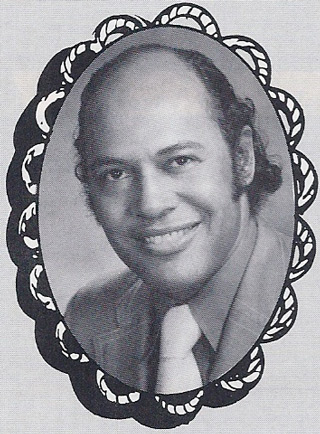
Dr. Walter R. Tucker, Jr.
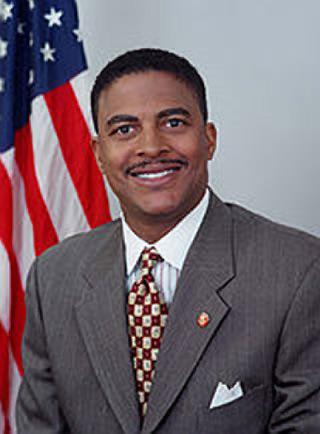
Walter R. Tucker III
*** Legends ***
Yussuf J. Simmonds
“They shared elected offices with the family”
A father’s presence has a special significance in the life of his son, and there is a natural kinship between father and son. For example, whenever parents end up in court and custody arrangements are made, most often the judge would require the father to spend TIME with his children. And where there is a father and son involved, the male presence is usually a stabilizing and positive force in a boy’s life. In honor of Father’s Day, the Sentinel has highlighted three fathers, and the sons who have demonstrated their examples of fatherhood.
DAVID S. CUNNINGHAM, JR. was appointed to the Los Angeles City Council’s 10th district in 1973 to replace Tom Bradley when Bradley became the mayor, and he served in that capacity until he retired in 1986. That was a very diverse district and, like his predecessor, Cunningham followed, representing the 10th district, which included Pico-Union and Koreatown. Prior to becoming a city councilman, he had a very diverse career in the private sector after earning his A.A. degree from Stowe Teachers College and serving in the United States Air Force as a cartographer until 1960.
Starting off at the historic 1960 Democratic National Convention in Los Angeles, California (where John F. Kennedy was nominated), Cunningham got a taste of politics. However, as prudency would dictate, he enrolled in UC Riverside to earn a Bachelors degree in economics and political science in 1962 before venturing off into the private sector. The following year, he did a public affairs internship serving as administrative aide to Assemblyman, Charles Warren and then moved to Lagos, Nigeria to become West Africa regional manager for the DuKane Corporation.
Back in the United States, Cunningham served as manager of community relations for Hughes in 1967 before founding Cunningham, Short, Berryman & Associates the next year as a management consulting firm to government and small businesses. In addition to being appointed to fill the vacancy created by the new mayor in 1973, Cunningham also received his Masters degree in urban studies the same year–the formal start of his entry into elective politics.
As a city councilman, he worked closely with the mayor in creating legislation to aid small businesses. Cunningham also pioneered the use of government grants to restore public buildings; created a system of community senior citizens centers; and served as chairman of the Grants, Housing and Community Development Committee. While on the council, he served in a leadership capacity developing legislation in the field of housing, public financing and intergovernmental relations. Cunningham served as state chairman of the California Delegation to the Democratic National Committee in 1976.
After his tenure as 10th district city councilman, Cunningham became the senior vice-president of the investment banking firm, Cranston Securities, where he utilized his experience in public financing; and then served in the same capacity at the Community Housing Corporation. He formed the consultant firm of Dave Cunningham and Associates, working as an advocate for various clients in the public and private sectors.
The David S. Cunningham Jr. Multi-service Center for senior citizens on west Washington Boulevard is named in his honor and he serves on the Los Angeles Convention and Exhibition Center Authority. Cunningham is the recipient of numerous awards including the Alex Haley Award and the Southern California Fair Housing Award. A politician and consultant, he is listed prominently in The History Makers.
David S. Cunningham, Jr. is the father of Los Angeles Superior Court Judge, David S. Cunningham III.
JUDGE DAVID S. CUNNINGHAM III has been a fixture in the community for over three decades as a lawyer and a community servant. In 2001, he was appointed as a member of the Los Angeles Police Commission and eventually became its president. While on the commission, he dealt with several high-profile issues regarding police shootings and the use of excessive force, and worked to institute changes in the department’s policies as they relate to proper policing and good community relations.
LAPD Commissioner John Mack, who followed Judge Cunningham as one of the police commissioners said, “I think the appointment of Judge Cunningham III to the Superior Court is an excellent move and represents a great choice. I had the opportunity of working with him initially when he served as a very outstanding and committed member of the Los Angeles Urban League board during my tenure as president of the League. He demonstrated a strong commitment to the community, a deep commitment to justice and later on, he preceded me as a member of the police commission.” Commissioner Mack seemed to mirror some of the changes that his predecessor implemented while he was on the commission, laying the groundwork for those who follow. “Every step of the way, he has demonstrated himself to be an outstanding legal mind,” Mack continued, “With a great judicial temperament and I think he will bring the kind of balance that we need to make sure that he interprets the law as it is. In my opinion, he will also have a real sensitivity for some of the challenges and issues the African American community have had to deal with in our experiences with the criminal justice system.”
In trying to learn how Judge Cunningham arrived at his judicial temperament and his commitment to the community, the Sentinel reached out to Cunningham, Jr., the judge’s father, who stated emphatically, “I’m really honored by his appointment; I really believe that he will be a very excellent judge. He has always had the judicious attitude about his approach to decision-making. He’s always been a lover of the law and a number one student of the law. So I’m really proud as any father would be.”
In projecting the work that lay ahead for Judge Cunningham, it is not difficult to predict the quality of his judgeship. He has a sterling legal background since graduating from law school. And the caliber of those who attended the judicial swearing-in ceremony highlights Cunningham’s integrity, including the Honorable Terry Hatcher, the federal judge for whom Cunningham served as a research clerk, assistant LAPD Chief Earl Paysinger and assistant Sheriff Paul K. Tanaka, who is also the Mayor of Gardena. Those who came to wish him well forebode the bright future ahead for Judge Cunningham as a member of the Los Angeles Superior Court.
Since becoming an esteemed member of the judiciary, Judge Cunningham has continued his commitment to bettering the Los Angeles community through his legal work, and his involvement on and off the bench.
MAXCY D. FILER. Next to the definition of the word, “persistent,” there should be a picture of Maxcy D. Filer, for he has probably sat on the California State Bar examination more times than any other living lawyer–past and/or present. But he has also been a diligent advocate for civil rights, and well known for his service to the Compton Community. Born in Mariana, Arkansas, Filer served in the US Navy from 1946 to 1949 before attending AM & N College in Pine Bluff, Arkansas before moving to Indiana where he married Blondell Burson of Elkhart, Indiana.
There Filer attended Elkhart Business University while working the night shift at Whitehall Pharmaceuticals; he graduated as a dental technician in 1952, the same year he moved to Compton. Having a new bride and a young family, as soon as he arrived in the Southland, Filer began working at Hearns Repair Service where he assembled aquatic equipment including swim fins, diving masks, snorkels and goggles. After a couple of years, he returned to the pharmaceutical industry at Diketan Pharmaceuticals in Culver City. In addition to working the day shift at Diketan, he worked the night shift at North American Aviation, working a 16-hour day.
In 1959, Filer continued his education at Compton College majoring in Public Speaking and then went on to Los Angeles Metropolitan Junior College where he earned an Associate of Arts degree. About the same time Filer began to ease into legal work doing legal research at the L.A. City Attorney’s office, and then as an agent settling disputes, and handling negotiations and arbitration for the U.S. Department of Labor. During the 1970s, Filer did legal research and interviewed clients for Compton’s Neighborhood Legal Services, and was a senior analyst for the Community Redevelopment Agency.
As a part of his community service, Filer initiated voter registration drives and represented the California delegation at the 1963 March on Washington. He was the president of the Compton NAACP during the 1965 Watts Rebellion and testified before the McCone Commission as to the cause of the unrest. Filer described the following as some of the root causes: the lack of affordable housing; the high rate of unemployment; and the lack of facilities for good medical care.
Being a witness to some of the inequities in the community made Filer more resilient in his efforts to raise and protect his family, and to contribute his time and energy towards community service. He was appointed to the Compton Personnel Board in 1971 where he served for six years and then was elected to the Compton City Council as the first district council member. There he had a lasting effect on the quality of life issues of the city.
In1989, Filer authorized a controversial city ordinance banning semi-automatic rifles which brought the city onto the NRA radar. But as controversial as it was, the ordinance was a step in the direction to curtail the violence that the city was notoriously known for, in addition to being the right thing to do.
Eventually Filer passed the State Bar Exam in 1991 and the entire city celebrated. He went from being his son’s law clerk to his son’s law partner, and he has continued to practice law up to the present.
Now semi-retired at 80, Filer spends his time enjoying his children and grand-children. The Compton Fire Department honored him for his outstanding and devoted service to the community, and periodically he has been the recipient of similar tribute for his life’s work.
Maxcy Filer is the father of Los Angeles Superior Court Judge Kelvin D. Filer in addition to Maxine, Duane, Stephanie, Anthony Dennis and Tracy.
JUDGE KELVIN D. FILER is the personification of ‘Straight Outta Compton.’ Born, raised, and educated in Compton, he insists on emphasizing that he is from Compton because historically, we tend to hear only negative things about the city. His message is not one of “look at me”- rather to tell the students and young people in Compton that if I made it, so can you!
As president of the Compton NAACP, Judge Filer’s father, Maxcy Filer, was inspiration for him to become an attorney. According to the judge, he would often sit in on the NAACP meetings about tactics, boycotts, demonstrations, etc., and a constant reference was made relative to “our lawyer” or “the attorney.” It piqued his curiosity as to “this person” to whom everyone was showing respect subliminally suggested that it was something that he wanted to aspire to become. He decided that he wanted that admiration and authority, and with suggestive nudging, from his father, set out to become a lawyer.
After graduating from Compton High School in 1973, he went the University of California at Santa Cruz where he majored in politics, receiving a Bachelors of Arts degree in 1977 while graduating with “college honors” (the top 30 students at Stevenson College). While at UCSC he was a member of the Black Student Alliance for four years and was a member of the Basketball Club for three years. He subsequently received his Juris Doctorate degree from UC Berkeley (Boalt Hall) in 1980.
In 1980, Judge Filer started practicing law as a Deputy State Public Defender for two years. It was during this period that he argued and won a landmark case before the California Supreme Court in 1980. The case was People v. Taylor (1982) 31 Cal 3d 488–a unanimous decision holding that criminal defendants have a right to wear civilian clothing–“the garb of innocence” during their trials. In 1982 he opened his own private law practice in his hometown of Compton, California, and he maintained a general criminal/civil practice with an emphasis on criminal defense work.
In July 1993, Judge Filer became a commissioner for the Compton Municipal Court and was later served as a Superior Court Commissioner after unification of the courts in 2000. He became a Superior Court Judge in 2002 where he is presently.
DR. WALTER R. TUCKER, JR., a dentist by profession, was born in Oklahoma and attended dental school at Meharry University in Nashville, Tennessee, before moving to Compton, California in the 1950s. Tucker Jr. was a member of Omega Psi Phi Fraternity, Inc. and while in dental school at Meharry in Nashville, TN, he had met and married Martha Hinton, a student at Fisk University. Tucker, Jr. came from a family of educators; his father was principal of the local high school in Haskell, OK, and his mother was a teacher there. Out of eight children, all obtained college degrees; Tucker, Jr. and two of his brothers were doctors, and the five other siblings obtained master’s degrees and became educators.
Tucker’s entry into politics was as a Compton City Councilman. In 1969, he lost a run-off with City Councilman Douglas Dollarhide to become the city’s first Black mayor. Eight years later, Tucker, Jr. lost a close race against Lionel Cade for the same position. Tucker was known for his persistency and finally in 1981, he tried again for the mayor’s post and was successful against the incumbent, Lionel Cade, whose tenure had suffered the misfortune brought on by Proposition 13. In addition to being mayor–which was a part time, ceremonial position, since the city manager was the actual day-to-day administrator of the city–Tucker, Jr. was a family man, a father of four children.
A full time dentist, circa 1970 Tucker bought land and built a medical building with his brothers, Booker T., an oral surgeon, and S. Edward, an OBGYN. At the time, they were in a small group of African American doctors in Los Angeles who owned their own medical building. Serving the Watts community for many years, the brothers finally sold the building in the 80’s and the area was redeveloped into a strip mall. In addition to practicing dentistry and holding political office, Tucker, Jr. served as an Associate Pastor at Zion Baptist Church.
As mayor, he presided over a period of reduced city revenues and guided the city through an era of fiscal austerity, brought on in the wake of Proposition 13. Tucker, Jr. served two full terms as mayor and died shortly after being elected to a third term in 1990 at the age of 66.
Dr. Walter R. Tucker, Jr. was the father of former Compton mayor and congressman, Walter R. Tucker III, and three other children: Camille, Kenneth and Keta.
WALTER R. TUCKER III became the mayor of Compton after his father, Dr. Walter Tucker, Jr., died in 1990. Tucker, III was born and raised in Compton, California, and was scion to a political dynasty known as the “Kennedys of Compton”. As the son of the mayor, he attended some of the nation’s premier universities. After graduating from Compton Senior High School as class valedictorian, he attended Princeton University 1974-1976, and then the University of Southern California 1976-1978. He graduated from the Georgetown University School of Law with a Juris Doctor, 1981; was admitted to the bar in 1984.
After being admitted to the bar, Tucker, III joined the district attorney office as a deputy and after his father died, he won a special election to replace him. He seemed to be following his father’s footsteps–a professional who became the mayor and an ordained minister. However, Tucker did not stay very long as mayor; upward mobility beckoned him; he served from 1991 to 1992. Around the time of the civil unrest in Los Angeles County spawned by the Rodney King verdict, he was elected to the House of Representatives as a Democrat to replace retiring Congressman Mervyn Dymally in 1992. After Tucker, III won the election to Congress, his brother attempted to carry on the family tradition as mayor, but was unsuccessful. For the first time in more than two decades a Tucker did not hold local political office in the City of Compton.
While in Congress, Tucker III served on the Committee on Public Works and Transportation and the House Small Business Committee. He held the respect and esteem of his colleagues on both sides of the aisle for his thoughtfulness on issues and his willingness to work with both parties. Tucker III was an ordained minister who was known to give the occasional Sunday morning sermon while visiting a church in his congressional district or even host bible studies in his Capitol office. He introduced legislation promoting Random Acts of Kindness, opposed passage of the North American Free Trade Agreement (NAFTA), fought to save the Long Beach Naval Shipyard, and worked to ensure the successful development of the Alameda Corridor Project. He also worked with the Army Corps of Engineers to secure federal funding to repair the long neglected Compton Creek, thus eliminating the possibility of costly flood damage to the homes and property on either side of the waterway.
Tucker III served on committees, earned the respect of his colleagues and visited his congressional district as time permitted. He boasted a young, energetic professional staff lead by his twenty-two year old Chief of Staff, Marcus Sebastian Mason, his District Administrator, Audrey Gibson (currently a member of the Florida Legislature representing Jacksonville) and Tyrone D. Bland (twenty-two), Director of Field Operations. Both Bland and Mason were natives of Tucker’s hometown of Compton.
Tucker III’s political career came to an abrupt end when he resigned from Congress in 1995, due to scandals involving accepting and demanding bribes while mayor of Compton. Tucker was sentenced to 27 months in prison in 1996 for extortion and tax evasion. After his release, he returned to Los Angeles, stayed a while and moved to the Chicago area, where he lives with his wife and two children: Autumn and Walter R. Tucker IV.
Â






